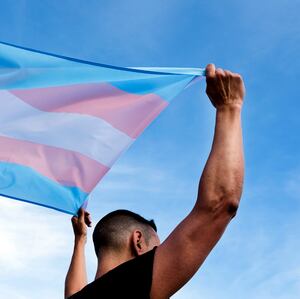Dear Trans Youth,
I hope this reaches you. I am an old, white, 60-year-old family guy. And while that description may not encompass you, as a trans man I’ve lived parts of your lives, seen life through some lenses we may share, and I see—in the raft of awful anti-trans bills in state legislatures—a return to society harming you the same way I was harmed. So, I cannot remain silent any more.
As I write this another conservative state, Arkansas, has passed legislation that restricts your access to health care, and sports. Alabama is attempting to make it a felony to provide gender-affirming care to trans kids. Over 60 anti-trans bills are being considered across the country, and that can sound scary and daunting.
Alabama doesn’t stop there. They have another bill focusing on sports exclusion in schools. It wasn’t that long ago that our Black athletes were believed to have an advantage in sports and their ability to compete was questioned. None of this bigotry ages well, and I’m sorry you can’t just jump ahead to the day where transphobia will smell just as foul as racism does. (At least President Biden and the Pentagon are doing the right thing in allowing trans troops to serve, and fully eradicating Trump’s absurd “ban.”)
Trans kids need support. To everyone reading this, we need your help. Parents can be advocates for transgender youth of their own and other parents can be effective allies in their communities. Know what legislation is attacking transgender people across America, and lobby your political representatives.
My life finally changed in 1985 while living in Mississippi working on finishing a doctorate in music. My youth, growing up in Kentucky, was plagued with creating space for my own survival as a boy who no one noticed until someone pointed at me and said, “That’s a girl!”
Everyone knew my discomfort, yet adults knew what was “best” for me, heaping shame onto my back to conform, shoving me into a box that made “them” more comfortable. In grade school I was so talented at basketball the fifth grade teacher, who was female, advocated for me to be able to play boys’ basketball. The PTA would have nothing of it.
At the age of 25, after four long years of therapist after therapist, the gatekeepers of society finally accepted my everyday efforts since the age of 4 to convince the world I was a boy, and my life began, or suicide would have been my last resort.
I wrote to Paul Walker, the first president of the HBIGDA and president of the Janis Information Facility in California, but he wasn’t successful in finding a therapist for me in the South. Once I moved to Mississippi, Walker sent me the name of famed sexologist Mark F. Schwartz, prodigy of Masters and Johnson, who had started a practice in New Orleans just less than a two-hour drive away from my life in Mississippi. These names, unbeknownst to me, would later become part of the trans genealogy fabric.
I was from a poor family, living off of my teaching assistantship and heavy loan debt that paid for my therapy. I couldn’t continue my education because I was exhausted from the stress of surviving against the odds.
Hormone therapy balanced my emotional turmoil, lined up my identity, corrected excruciating monthly pain, made my world colorful, tolerable, and on a much better footing once I disappeared into another state and a new life. I was saved, to an extent, by my only choice, a music career that left me with skills. I flourished through working harder than most, yet I was still haunted by insecurity of a hidden past; a history of having a boulder on my back for way too long. Even in 1985 the medical profession still couldn’t distinguish sex and gender, even though there were gender-confirming surgeries dating back to the beginning of the 1900s.
Bathrooms still are places I feel most uncomfortable and at risk. It’s amazing to me that cis women think a phantom trans women will make them unsafe in a restroom when the reality is it is the trans person that feels unsafe going to any bathroom, and does everything to attempt never to go into a public bathroom.
Do you have any idea what it feels like to never want to enter a place you must because your body just can’t hold it any longer? You do, and I know your discomfort. Do you know what it was like for a 13-year-old trans boy to not be able to go to the bathroom at his own school, walking into the girls’ bathroom, and someone inevitably shouting, “There’s a boy in the girls bathroom!”
I never went into any bathroom in my high school—always holding it until I arrived home, praying I would make it each long day. Do you know what it’s like to try to get in and get out, even today, as soon as possible because your life could end at any moment if the wrong person decides you shouldn’t be there? Every trans person knows this anguish. This hasn’t left me even though today I am undetected as anything but a cis man.
I may not know, but I can well understand what Black men feel like just walking down the street where at any moment they could have a cop decide their existence is not valuable. Our struggles are not the same, but they have a common context. We have a problem in America and it’s not transgender people invading your public bathroom space.
To trans kids out there, while the present legislative focus is on excluding you from society, the tactics aren’t new. Isolating you is intended to make you silent and repressed, while also making you out to be the potential predator and persecutor.
To those that seek to denigrate us, we are a political game, pawns; and this game is more important than your acceptance into their society. You are the new target of discrimination, in a bigger and more longstanding parlaying of bigotry for votes and donor funding. Persecuting us is just a game of money and power to those who attack us.
The problem for the bigots is this: We are here whether you chose to count us or not. None of this legislation will stop a trans person from who they are, it will only give them less choices in life, seeking out help underground taking risks with their health and lives or choosing suicide. They are literally putting a bullseye on the backs of trans youth.
I spent the first 35 years of my life not meeting another trans male like myself. Not one. Oh, I saw the rare occasion talk show guest, but there must only be very few of us, right? My life changed in August 1995 when I attended the first FTM Conference of the Americas “A Vision of Community” held in San Francisco.
I went from thinking there were a small number of us to standing shoulder to shoulder with over 300 guys from all walks of life and all kinds of identities. I was not going through this alone, and that changed my perception of myself and my shame. To know there are others like you is a milestone. To have a chance at having a community filled with people who have stories to tell similar to your own gives you hope.
Parents: Be an advocate for kids, all kids whether they are yours or not. I learned one important lesson from the man who raised me, the man I adored yet disagreed with on almost everything. He was my grandfather, yet I called him “Dad”. He had fought on the ground of most of the big battles in World War II and never spoke of it.
We were a family obsessed with sports. When asked “Who do you want to win?” his reply was always the same, “I just want to see a good game. It’s not about any one team, it’s about seeing a good game.” Honor the game by letting everyone compete as themselves. It’s about the camaraderie and connection. Winning or losing is a byproduct that has been exploited to gluttonous levels. Sport is about giving your best after long hard training. No one should be denied that opportunity.
So, as we enter yet more weeks where our right to be is debated, not accepted, and where people actively try to erase us, I want you, trans youth, to know you are not alone. I’m not Black, trans-feminine, or non-binary, but I know others who are, and I was part of the activism of the 1990s where these issues were a battleground as well. We are here, we are everywhere, and society will have to let us in. If not now, we will keep knocking louder and louder, humanizing the dehumanizing statistics.
Trans youth: Your happiness should not be governed by the people with no knowledge or experience of what it means to not fit a gender box. I am here, coming out to you after living a very long life as a man, telling you that I am queer, even though I have spent the majority of my life in the shadows. I am your witness.
I am trans, and I am a straight married man with a family, educated, and respected in society. I’m very lucky, but still have my struggles overcoming the burden of an exhausted youth at battle with the world. I want more for you. I want to see you shine. Then I will know that truth has prevailed.
Yours truly, Dan Duncan







